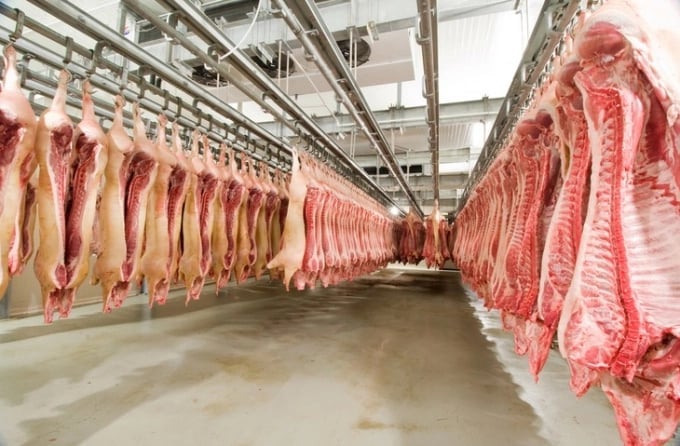June 19, 2025 | 09:37 GMT +7
June 19, 2025 | 09:37 GMT +7
Hotline: 0913.378.918
June 19, 2025 | 09:37 GMT +7
Hotline: 0913.378.918

Pork consumption in Vietnam is forecast to increase by nearly 30% in the next 7 years.
According to the Agency of Foreign Trade (Ministry of Industry and Trade), the latest forecast of the United States Department of Agriculture (USDA), shows that, in the period 2023-2030, pork consumption in Vietnam in 2030 will increase by 28.3% compared to 2023.
Also according to USDA forecasts, global pork consumption is expected to reach 131 million tons in 2030, an increase of 7.2% compared to 2023. Of which, pork consumption in the United States is expected to increase by 11.7%; increase by 5.8% in China; and increase by 4.5% in Russia.
Also by 2030, pork consumption in Latin America is expected to increase by 14.2% compared to 2023, reaching 10.7 million tons. Leading countries in the region such as Brazil, Mexico and Argentina have expected consumption of 3.5 million tons, 3 million tons and 1 million tons respectively in 2030. Compared to 2023, consumption increases by 10.6%, 13.5% and 27.6% respectively.
For Central America and the Caribbean, total pork consumption is estimated to reach 1 million tons in 2030, up 19% from 2023. Meanwhile, USDA expects the European Union's pork consumption to decline by 3.9%, from 18.4 million tons in 2023 to 17.7 million tons in 2030.
USDA forecasts total global meat consumption (beef, pork and chicken) will increase by 9.6% over the next 7 years, from 327 million tons in 2023, increasing to 358.4 million tons by the end of 2030.
Of which, global beef consumption is expected to reach 80.2 million tons in 2030, an increase of 7.3% compared to 2023; global poultry meat consumption is expected to reach 147.5 million tons in 2030, an increase of 13.2% compared to 2023.
Translated by Hoang Duy
/2025/06/17/2344-1-131758_261.jpg)
(VAN) Amid tariff risks and growing trade barriers in the U.S. market, Australia is emerging as a promising destination to sustain the growth momentum of Vietnam's shrimp exports.
/2025/06/17/2013-1-nongnghiep-112009.jpg)
(VAN) This notable growth trend reflects the global taste for fresh, nutritious fruits and the expanding use of lychees across various sectors.

(VAN) The political and cultural insulation of Japan’s beloved grain is falling apart, and experts warn the country’s relationship with the staple will have to adapt.

(VAN) Noting risks, report examines impacts of avian influenza, changing trade patterns since 2022, fish fraud, and shipping industry’s net-zero goals.

(VAN) Mr. Tran Quang Bao, General Director of the Forestry and Forest Protection Department, met and worked with the International Wood Products Association to promote cooperation in the field of timber trade.

(VAN) China's outbound shipments of rare earths in May jumped 23% on the month to their highest in a year, though Beijing's export curbs on some of the critical minerals halted some overseas sales.

(VAN) To sustain capital flow, administrative reform alone is not enough; what farmers truly need is an ecosystem where both government and businesses grow together in support.